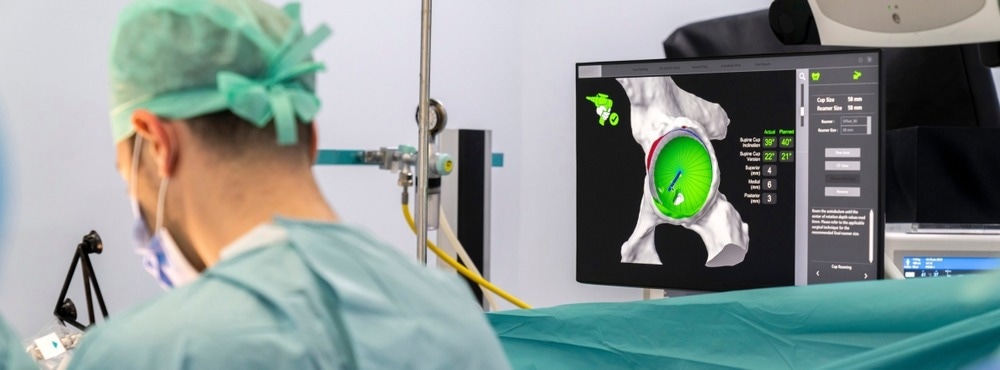A new study has reported that robotic-arm assisted unicompartmental knee arthroplasty (UKA) offers good long-term results, implant survival, and patient satisfaction rates surpassing 90% at 10 years follow-up.

Image Credit: MedicalWorks
The study has been reported in The Journal of Bone & Joint Surgery. It has been published in the Lippincott portfolio in collaboration with Wolters Kluwer.
This prospective multicenter study found high 10-year survivorship and patient satisfaction following robotic-arm-assisted medial UKA.
Tarik Bayoumi, MD, Hospital for Special Surgery, Weill Medical College, Cornell University
First Data on Long-Term Outcomes of Robot-Assisted UKA
In UKA, just one of three compartments of the knee—the medial compartment—has been substituted with a prosthesis. Since it conserves most of the normal knee anatomy, UKA might provide a brief hospital stay and higher knee range of motion postoperatively compared with the more common and broad total knee arthroplasty (TKA).
Earlier studies have displayed that using a surgeon-controlled robotic arm can enhance the precision of UKA, possibly preventing technical errors that could impact outcomes postoperatively.
Previous studies have reported high survivorship free from conversion to TKA at mid-term follow-up after robotic-arm-assisted UKA.
“Given the increased use of robotic systems in knee arthroplasty and the favorable early outcomes, the current challenge lies in demonstrating whether these results can be maintained at longer-term follow-up,” the researchers write.
In their prospective study, Dr. Bayoumi and collaborators examined the 10-year results of 411 knees in 366 patients performing robotic-arm-assisted medial UKA at four participating centers. Nearly 57% of the patients were male, and the average age at surgery was 67.2 years.
All the procedures were executed by four experienced knee arthroplasty surgeons with special training and practice in robotic-arm-assisted UKA.
The study included a decade of follow-up data on the initial series of patients who got a particular kind of cemented implant (Restoris MCK System) and a third-generation robotic-guided surgical system (Mako Robotic-Arm Assisted System).
Around ten years from now, satisfaction rates and freedom will be high from TKA.
Follow-up results displayed good results for robotic-assisted UKA. The survivorship with the medial UKA implant still in place was 91.7%. Among the 29 revisions, 26 were a conversion to TKA, having a survivorship of 92.6%.
The conversion rate to TKA was around twice as high in women than in men: hazard ratio of 2.3. Also, revision risk was greater for patients with a body mass index of 30 kg/m2 or higher; and for younger patients, this probably reflects a highly active lifestyle and increased demands on the knee. Most revision surgeries led to aseptic loosening or undiscovered knee pain.
Patient satisfaction ratings assisted the excellent results of robotic-assisted UKA.
“Of all patients without revision, 91% reported being either very satisfied or satisfied with their operative knee, while 4% were dissatisfied or very dissatisfied,” the researchers write.
With the long-term studies of conventional UKA, the high survivorship and patient satisfaction rates are compatible. The scientists note a few limitations of their study, emphasizing the requirement for prospective comparative studies.
Since this was a single-arm trial, it remains to be determined whether robotic-arm assistance for UKA results in improved outcomes compared to conventional UKA.
Magdy Bayoumi, University of Louisiana at Lafayette
Journal Reference
Bayoumi, T., et al. (2023) Ten-Year Survivorship and Patient Satisfaction Following Robotic-Arm-Assisted Medial Unicompartmental Knee Arthroplasty. The Journal of Bone and Joint Surgery. doi.org/10.2106/JBJS.22.01104.